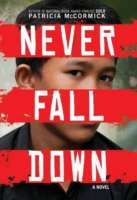
Cambodian child soldier Arn Chorn-Pond defied the odds and used all of his courage and wits to survive the murderous regime of the Khmer Rouge.
See the review at WOW Review, Volume 5, Issue 1
- ISBN: 9780061730931
- Author: McCormick, Patricia
- Published: 2012 , Balzer + Bray
- Themes: child soldiers, Fear, Survival
- Descriptors: Asia, Cambodia, Historical Fiction, Young Adult (ages 14-18)
- No. of pages: 216

Holly
Never Fall Down is absolutely gripping, Marilyn! I sat down and the story would not let me go! I knew about the Khmer Rouge from my own youth, but this book gives details that just caused me to wonder how people can do such things to one another. I kept thinking, “Imagine being Arn Chorn-Pond, an 11-year-old who, once taken by the Khmer Rouge and separated from his family, learned to survive through innovation and the ability to adapt.” I mean, this child is 11 years old, and the things he did to survive. What an inspiring, yet deeply sad story. He amazingly learned to adapt for eight years, and his story is both fascinating and horrifying. Arn’s ability to be invisible when necessary, useful when expedient, and eventually a voice that broke the silence about the cruelties his country people endured under the Rouge’s regime creates a haunting and stark coming of age story under the most extreme circumstances. I remember one statement he made, “I make my eye blank. You show you care, you die. You show fear, you die.
You show nothing, maybe you live” (p.59). I felt the use of language created a more realistic story, and so McCormick, the author who wrote Arn’s story and filled in some gaps, made the right choice with the language.
I would want to read this with young people and talk about Arn, about survival, and about McCormick’s research that allowed her to help Arn fill in some of the gaps, which then makes this a novel, a retelling, rather than a biography. Students should know how this is done and why. This is another holocaust story from another continent, and just like many of the Holocaust stories from out of Europe, there is hope. Arn created his own hope, which should really inspire readers.
Marilyn
I think one of McCormick’s achievements in this book (and there are many) is how she got the voice of Arn right. His voice sounds so true. The last class I had as an elementary teacher was an amazing group of twelve to fourteen-year olds who were new immigrants to our country. Most of them came from Viet Nam but several were Cambodian. Reading Arn’s story felt like one of those students was speaking to me again. Each of those students had a sad story to tell, but none of them had been through the horrors of the Khmer Rouge. In our class the students began writing their own narratives of how they came to this country. Writing those stories was a healing process for the students and they worked on them all year.
It seems like Arn also needed to tell his story through the talks that he gave. I hope that telling his story provided healing for him too. This is a hard book to read, so many of Arn’s accounts are so terrible. Yet, amid the terror, Arn provided a healing humanity that helps others in his same situation. As you wrote, this is a book that demands class discussions. Teachers and librarians will need to offer a great deal of background information so the students will have an understanding of the conditions that contributed to the rise of the Khmer Rouge.
Holly
I agree with you, Marilyn, about getting the voice right. It helped me really see Arn, and to recognize his humanity, his vulnerability, and his anger and fear. I am amazed by his story and the hope he inspires in his talks currently. To survive and to conduct work around issues of justice and care . . . we are so fortunate to have him here.